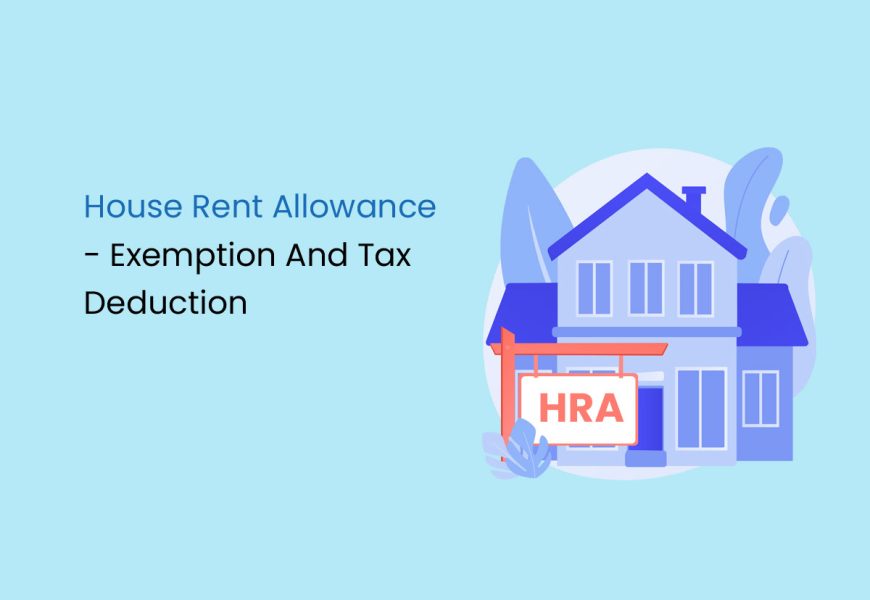House Rent Allowance (HRA) constitutes a vital element within the compensation structure of numerous professionals. Notably, HRA enjoys partial tax exemption despite being an integral part of one’s earnings. Section 10 (13A) of the Income Tax Act of 1961 outlines the provisions under which a portion of HRA remains untaxed.
In the computation of taxable income, the HRA exemption amount is subtracted from the total income, presenting an avenue for individuals to optimise tax savings. However, it is imperative to note that this tax benefit is contingent upon certain conditions. Specifically, if an employee resides in a self-owned residence and does not incur rental expenses, the HRA received from the employer becomes entirely subject to taxation.
In this article, we delve into the nuances of House Rent Allowance, exploring its tax implications and elucidating the considerations that individuals need to know about to use this financial benefit effectively.
What is House Rent Allowance (HRA)?
Rule 2A of the Income Tax Rules intricately governs the treatment of House Rent Allowance (HRA) for salaried individuals, aligning with the stipulations of Section 10 (13A) within the Income Tax Act. This provision plays a pivotal role in delineating the permissible exemptions associated with HRA for those employed.
Contrastingly, self-employed individuals find themselves outside the purview of HRA exemptions as prescribed by this specific provision. However, this does not preclude them from potentially benefiting from tax advantages, as Section 80GG of the Income Tax Act offers an alternative avenue for such individuals to explore.
Under this framework, the option to avail tax exemption on house rent allowance becomes obsolete. In this context, HRA benefits are exclusively accessible under the old tax regime, adding an additional layer of consideration for individuals navigating the nuances of the tax landscape. As we navigate through these regulations, a nuanced understanding emerges, guiding individuals to make informed decisions aligning with their specific financial circumstances.
How is House Rent Allowance (HRA) Calculated?
Calculating House Rent Allowance (HRA) for salaried employees involves considering specific parameters outlined in the Income Tax Act. The HRA exemption, relief from income tax liabilities, is determined based on the least of three components:
- Actual HRA Received: The amount of HRA received from the employer constitutes one element of the calculation.
- Percentage of Basic Salary: Depending on the location of residence, a percentage of the basic salary is factored in. Specifically, if residing in a metro city such as Delhi, Kolkata, Mumbai, or Chennai, 50% of the basic salary is considered. For non-metro cities, this percentage is reduced to 40%.
- Rent Paid Minus 10% of Basic Salary: The calculation involves subtracting 10% of the basic salary from the actual rent paid.
Here’s a breakdown of the components:
- Actual HRA received by the employer
- 50% of the basic salary (for metro cities) or 40% of the basic salary (for non-metro cities)
- Rent paid minus 10% of basic salary
The term “basic salary” in this context encompasses the sum of basic salary, dearness allowance (DA), and commission on sale at a fixed rate. Considering these three elements, the calculation aims to determine the HRA exemption, offering salaried individuals a structured approach to understanding their tax implications related to housing allowances.
Is House Rent Allowance (HRA) Taxable?
House Rent Allowance (HRA) is considered a part of your salary income and, by default, is taxable. However, if you reside in a rented accommodation, you have the opportunity to claim a tax exemption, either partially or wholly, under Section 10(13A) of the Income Tax Act. This provision is commonly referred to as HRA exemption. It’s important to note that the entire HRA becomes taxable if you don’t live in a rented accommodation.
It’s crucial to be aware that the tax exemption on house rent allowance is not applicable if you opt for the new tax regime.
- For self-employed individuals, the concept of HRA does not apply. However, they can seek tax deductions related to rented accommodation under Section 80GG.
- Salaried individuals, on the other hand, can leverage Section 10(13A) and Rule number 2A of the Income Tax Act to claim exemptions for House Rent Allowance. Given that HRA is a significant component of an individual’s salary, adherence to the company’s policies regarding the claiming of HRA is paramount.
Tax Exemption on House Rent Allowance (HRA)
When seeking tax exemption for House Rent Allowance (HRA), it’s essential to consider specific scenarios that may involve special claims. Here are some key considerations:
Non-ownership of Rental Premises
To qualify for HRA deduction, the individual cannot own the rental premises. For instance, if you live with your parents and pay them rent, you can claim an HRA deduction. However, claiming HRA for your spouse’s rent may face scrutiny, as couples are expected to share housing.
Documentation for Transactions
When renting a house from your parents, it’s crucial to maintain documentary evidence of financial transactions and rent receipts. This documentation is essential to substantiate the validity of the transactions in case the Income-tax Department scrutinises the claim. Keeping a record of financial transactions helps provide transparency and credibility to your HRA claim.
Rental Agreements with Parents
If renting from parents, ensure that there is a formal rental agreement outlining the financial terms between you and your parents. Lack of proper documentation may lead to the denial of your HRA claim if the validity of the transactions is questioned.
Recent Tribunal Decision
A recent example from the Mumbai income tax appellate tribunal highlights the importance of a valid claim. In this case, a salaried taxpayer’s HRA petition was dismissed because tax officials found the claim to be invalid. This underscores the necessity of ensuring that your HRA claim aligns with the applicable rules and regulations.
Employing HRA and Home Loan Benefits
If you own a house leased out or live in a different place, you may be eligible to avail benefits related to HRA and home loan simultaneously. This includes deductions for both ‘interest charged’ and ‘principal repayment’ on the home loan, along with HRA.
Documents to Avail of HRA Taxation
To successfully claim tax exemption on House Rent Allowance (HRA), individuals are required to furnish specific documents that substantiate their rental arrangements. The following documents are crucial for availing the HRA exemption:
- Proof of Rent Payment: The primary document for claiming tax exemption on HRA is the rent receipt, supported by the rental agreement. In the absence of rent receipts, bank statements reflecting the rent transactions become essential. Importantly, even if the rent is paid to parents, taxpayers can still qualify for this exemption.
- Bank Statements: In cases where rent receipts are unavailable, providing bank statements that demonstrate the rent transactions is a valid alternative to support the claim for HRA exemption.
- PAN Card of Landlord/Landlady: As a taxpayer seeking HRA exemption, it is necessary to submit the PAN card details of the landlord or landlady. This requirement becomes particularly relevant when the annual rent for the housing unit exceeds Rs.1 lakh.
- Self-Declaration Form: In instances where the landlord or landlady does not possess a PAN card, a self-declaration form becomes crucial. This document, provided by the landlord, attests to the absence of a PAN card and supports the HRA exemption claim.
Rules For Tax Exemption on HRA
The exemption rules for House Rent Allowance (HRA) are governed by specific guidelines outlined in the Income Tax Act. Here are some prominent rules related to HRA:
- Percentage of Basic Salary: The amount of HRA is calculated based on a percentage of the individual’s basic salary. For residents in non-metropolitan areas, the applicable percentage is 40% of the basic salary, while for those in metropolitan areas, it is 50% of the basic salary.
- Eligibility for HRA Benefit: Individuals can claim HRA exemption even if they pay rent to their parents. Rent receipts and relevant documentation are required to support this claim. However, claiming HRA exemption for rent paid to a spouse is not permissible under the income tax law.
- Submission of Rent Receipts: To avail of the tax exemption benefit, individuals need to submit rent receipts as proof of the rent paid for accommodation.
- PAN Card Details of Landlord: Furnishing the PAN card details of the landlord is mandatory for availing HRA exemption. This information is crucial for making relevant tax deductions from the landlord’s income received from property (rent).
- The threshold for PAN Details: PAN details of the landlord are specifically required if the annual rent paid exceeds one lakh rupees. Below this threshold, providing PAN details may be optional.
- Income Tax Liability for Own Homes: Employees who live in their own homes but receive HRA are still subject to income tax. In such cases, the HRA is considered a part of their taxable income.
How to Claim an HRA Tax Exemption?
To claim HRA exemption:
- Live in rented accommodation.
- Ensure HRA is part of your CTC.
- Submit valid rent receipts and proof of payments.
- Calculate exemption based on salary, rent paid, HRA received, and city of residence.
- Provide documents to your employer.
- Include exempted HRA in your tax return.
- Furnish PAN details of the landlord if applicable.
Following these steps ensures a smooth process to claim HRA exemption.
NOTE: If you live in a rented house where the annual rent amount exceeds Rs.1 lakh, you will be required to submit the PAN card details of the house owner. However, if the owner does not possess a PAN card, a self-declaration stating the absence of a PAN card must be provided. This requirement is in accordance with Circular No. 8/2013.
How to Calculate House Rent Allowance (HRA)?
To calculate House Rent Allowance (HRA) and maximise tax savings, consider the following steps:
Understand HRA Components
- HRA is a portion of your compensation designated for housing expenses.
- It serves as a valuable tool for tax deductions, reducing taxable income.
Eligibility for Tax Benefits
- Tax benefits associated with HRA are exclusive to salaried individuals residing in rented accommodations.
- Employees living in their own homes are not eligible for HRA tax deductions.
Percentage of Basic Salary
- HRA calculation considers the percentage of the employee’s basic salary.
- In metro cities, the eligible percentage is 50% of the basic salary, while in non-metro cities, it is 40%.
Three Provisions for Calculation
- Ensure the actual rent paid is at most 10% of the basic salary.
- Consider 50% (for metro) or 40% (for non-metro) of the basic salary.
- Factor in the HRA amount allocated by the employer.
Combining these factors allows you to calculate the HRA amount eligible for tax exemption. It’s crucial to keep accurate records of rent payments, adhere to the specified percentages, and use the provisions outlined for HRA calculation. This strategic approach enables individuals to optimise tax benefits associated with their housing allowance.
Example 1
Jason earns an annual income of Rs. 3 lakh and pays a rent of Rs. 5,000 per month (Rs. 60,000 annually). Let’s calculate the HRA deduction:
- Monthly rental limit: Rs. 5,000 (Rs. 60,000 annually).
- Rent paid: Rs. 60,000 – 10% of the adjusted income (Rs. 30,000) = Rs. 30,000.
- 25% of the total annual income: Rs. 75,000.
In this case, the second condition is satisfied, and Jason can claim an HRA of Rs. 30,000.
Example 2
Anwar earns an annual income of Rs. 8 lakh and pays a rent of Rs. 10,000 per month (Rs. 1.2 lakh annually). Let’s calculate the HRA deduction:
- Monthly rental limit: Rs. 10,000 (Rs. 120,000 annually).
- Rent paid: Rs. 120,000 – 10% of the adjusted income (Rs. 80,000) = Rs. 40,000.
- 25% of the total annual income: Rs. 2 lakh.
In this case, the second condition is satisfied, and Anwar can claim an HRA of Rs. 40,000.
HRA Tax Deduction Under Section 80GG
To claim a deduction under Section 80GG of the Income Tax Act, individuals need to consider the following and select the lowest amount among them:
- Individuals can claim a deduction of Rs. 5,000 per month towards rent paid.
- Calculate 25% of the adjusted total income.
- Determine the actual rent paid and subtract 10% of the adjusted total income from it.
- Adjusted Total Income is calculated by subtracting long-term capital gains, short-term capital gains under section 111A, section 115A or 115D, and deductions from sections 80C to 80U from the total income.
Claiming the deduction involves choosing the least amount among these three calculations. This deduction is particularly beneficial for individuals who do not receive HRA (House Rent Allowance) and do not own a house.
Claiming Deduction Without House Rent Allowance (HRA)
If you are paying rent for your residential accommodation but do not receive House Rent Allowance (HRA) from your employer, you can still benefit from a deduction under Section 80GG. To claim this deduction, certain conditions must be fulfilled:
- You should be either salaried or self-employed.
- You must not have received HRA at any time during the year for which you are claiming the deduction.
- You, your spouse, your minor child, or the Hindu Undivided Family (HUF) of which you are a member should not own any residential property at the location where you currently reside, work, or conduct business or profession.
- If you own any residential property other than the one mentioned above, you should not claim the benefit of that property as self-occupied. The other property would be deemed to be let out to claim the Section 80GG deduction.
Procedure for Claiming Section 80GG Without House Rent Allowance (HRA)
If your employer does not provide HRA despite living in rented accommodation, you can still claim a deduction under Section 80GG. Ensure the fulfilment of the above conditions and proceed with the claim in your tax filings. This deduction is a valuable benefit for individuals who do not receive HRA and meet the specified criteria.
Example
Mr Anwar works in New Delhi and pays rent of Rs.15,000 per month during the Financial Year (FY) 2021-22. Here’s the calculation for HRA exemption:
Mr Anwar receives HRA from his employer, which is Rs.1,00,000.
1. 50% of Basic Salary and DA:
- Basic Salary: Rs.25,000
- DA: Rs.2,000
50% of (Basic Salary + DA) x 12 months: Rs.1,62,000.
2. Rent Paid minus 10% of Salary:
- Rent Paid: Rs.15,000 x 12 months = Rs.1,80,000
- 10% of (Basic Salary + DA) x 12 months: Rs.14,400
- Rent Paid minus 10% of Salary: Rs.1,65,600.
In this example, the entire HRA received from the employer (Rs.1,00,000) is exempt from income tax. This is because the calculated amounts based on 50% of basic salary and DA (Rs.1,62,000) and rent paid minus 10% (Rs.1,65,600) are higher than the actual HRA received.
Therefore, Mr Anwar can claim the entire HRA amount as exempt from income tax in the Financial Year 2021-22.
Availing Tax Benefits on Home Loans and House Rent Allowance (HRA)
Tax benefits can be maximised by strategically leveraging both Home Loan benefits and House Rent Allowance (HRA). Here’s how you can do it:
House Rent Allowance (HRA) Benefits
- HRA benefits are applicable when you are paying rent for your accommodation.
- Ensure proper documentation of rent payments and submit rent receipts to your employer for HRA exemption.
Home Loan Benefits
- If you own a property and have a home loan, you can claim tax benefits on the interest paid and principal repayment.
- However, if you have rented out your owned property and are staying in a rented place, you need to disclose the rental income, and tax will be deducted accordingly.
Claiming Exemption on Both
- If you own and rent out a property while staying in a rented place, you can claim tax benefits on both the Home Loan and HRA.
- However, it’s crucial to disclose rental income from the owned property.
Conditions for Dual Exemption
- Both owned and rented properties should be in different cities to claim exemptions on both.
- If both properties are in the same city, exemptions on both HRA and housing loans cannot be claimed.
- Exception: If you can prove that the owned property is far from your workplace and the rented accommodation is necessary, you may be eligible for exemptions on both.
FAQs on House Rent Allowance (HRA)
How is HRA Calculated?
You can calculate HRA by [Rent Paid] - 10% of the Basic Salary.
Is HRA 50% or 40%?
The HRA limit for salary is 50% of the basic salary for individuals residing in metro cities and 40% for individuals living in non-metro cities.
What is the HRA limit for 2024?
50% of the employee's basic salary if they live in a metropolitan area (Delhi, Mumbai, Kolkata, or Chennai), or 40% if they live in a non-metropolitan area. The rent the employee pays minus 10% of the employee's basic salary.
What is the Formula to Calculate HRA?
The amount of tax deduction that you can over HRA is the least of the following:
- Actual rent paid minus 10% of the basic salary, or
- Actual HRA offered by the employer, or
- 50% of salary when the residential house is situated in a metropolitan city; 40% of pay when the residential home is located in a non-metropolitan city
How do you claim HRA on tax returns (ITR)?
To claim House Rent Allowance (HRA) on your tax return, include the taxable portion of the HRA component in the 'Salary as per Section 17(1)' calculation. Add an exempt category under the heading ‘allowances to the extent exempt u/s 10’.
How to claim HRA while Living with Parents?
One method to claim HRA while residing with your parents is to establish a rental agreement with them. Agree on a monthly rent amount, and then deduct this sum from your taxes by claiming it as HRA when filing your income taxes.
How to Claim HRA if Not Mentioned in Form 16?
If your Form 16 does not mention the HRA category, it implies that your employer has not provided this component. You can claim HRA separately when your employer does not include it in Form 16. Alternatively, you may claim rent paid under Section 80GG.
Is House Rent Allowance Fully Exempt from Taxation?
No, only a portion of the House Rent Allowance (HRA) is exempt from taxation, and there are specific limitations.
Are Self-Employed Individuals eligible for HRA Exemption?
No, self-employed individuals are not eligible for HRA exemption. This benefit is applicable only to salaried individuals with an HRA component in their compensation.
Which Income Tax Category is HRA under?
HRA falls under Section 10(13A) of the income tax.
Does HRA Vary in metropolitan cities?
Yes, HRA is dependent on the city of residence. Moving from a non-metro city to a metropolitan city may change your HRA from 40% to 50% of your basic salary.
What are the Documents Required for HRA Exemption?
Required documents include PAN Card, rent receipt, and a photocopy of the rent agreement if necessary.
Can you claim HRA and Home Loan Tax Exemption?
Yes, you can claim both tax exemptions by providing sufficient proof for each.
Is Paying Rent to Father eligible for HRA Benefit?
Yes, you can pay rent to your father to avail the HRA tax exemption.
How does the location of residence and work impact HRA calculation?
In case of different cities for residence and work, the HRA calculation considers the place of residence rather than the place of work.
What should I do if my employer refuses the HRA tax benefit?
If your employer denies the tax benefit, you can still claim it when filing your tax return. The exempted amount can be received as a refund of excess TDS.
Can both working spouses claim HRA tax benefits independently?
Yes, both working spouses can claim HRA tax benefits separately. This is possible if they are paying rent to the landlord and can provide separate receipts without any duplication.
When is a landlord's PAN required for HRA exemption?
PAN details of the landlord are necessary when the annual rent paid exceeds Rs.1 lakh.
What if the landlord does not have a PAN card?
In such cases, a self-declaration confirming the absence of a PAN card must be signed by the landlord, as per Circular No. 8/2013.





















